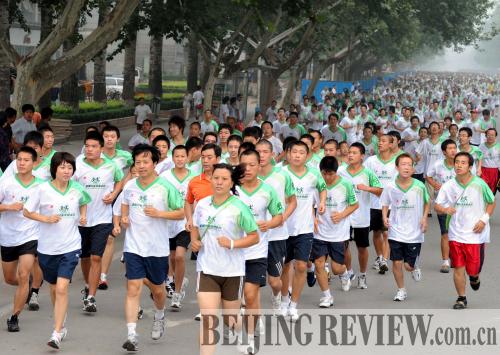|
 |
| TAKING IT TO THE STREET: A mass run is held to celebrate the country's first National Fitness Day on August 8, 2009, in Hebei Province (XINHUA) |
"The whole nation system remains the magic potion for lifting up all sports. We are also exploring a new path to integrate the national system with the market, just like what happened in billiards," said Wang Tao, a GASC official.
In April 2005, 17-year-old Ding Junhui beat Stephen Hendry to win the first World Snooker China Open. The snooker prodigy's story became a subject of great interest as his success was not a result of the whole nation system but because of cultivation by his family, who bore the full risk and sent him abroad for professional training. That story is common overseas but is considered to be gambling in China. But many consider it a trend in cultivating talent that the country will see more of in the future.
"Not all families have the money and power to train their children at such a large expense. The whole nation system still offers a chance for talented players who are not born with a silver spoon in their mouths," said Wang, who noted that Ding's path to success is acceptable nonetheless.
National fitness
"What's more important to measure a sports power is the national health and fitness level rather than the number of gold medals," said Liu, head of the GASC.
The government is endeavoring to build more civil fitness facilities as well as helping athletes garner gold medals. The number of all kinds of stadiums and gymnasiums has surpassed 850,000 nationwide.
In 2000, China launched a national civil health survey that is to take place every five years to monitor the country's overall health status. Since January 2009, the Chinese Government has set every August 8 as National Fitness Day. And on October 1, 2009, the country's first national fitness regulations were put into effect.
The Chinese who often participate in sports make up 28.2 percent of the population, said Zhang Yesui, Ambassador Extraordinary and Plenipotentiary and China's Permanent Representative to the United Nations.
Sports industry
This summer, big news in the Chinese sports world grabbed the attention of fans when they heard NBA superstar Yao Ming purchased his former club, the Shanghai Sharks. As sports continue to develop and more citizens become spectators, many people like Yao see big money in the Chinese sporting industry.
"Matches and entertainment are the two core factors in the sports industry," said He Wenyi, Deputy Director of the Sports Industry Research Center at Peking University. Both factors will also provide a big boost to the related service, transportation, tourism, communications and financial industries.
It was not until the 1980s that China began developing a sports industry, and the country's advancements are still several steps behind those of developed countries in terms of sports media, advertising, big events and investment in clubs. In 2008 the U.S. sporting industry generated $1 trillion, making up 7 percent of the gross domestic product while in China the industry comprises a mere 0.7 percent.
"When sports become a way of life and people build loyalty to sports, the market will be enormous," said He. | 